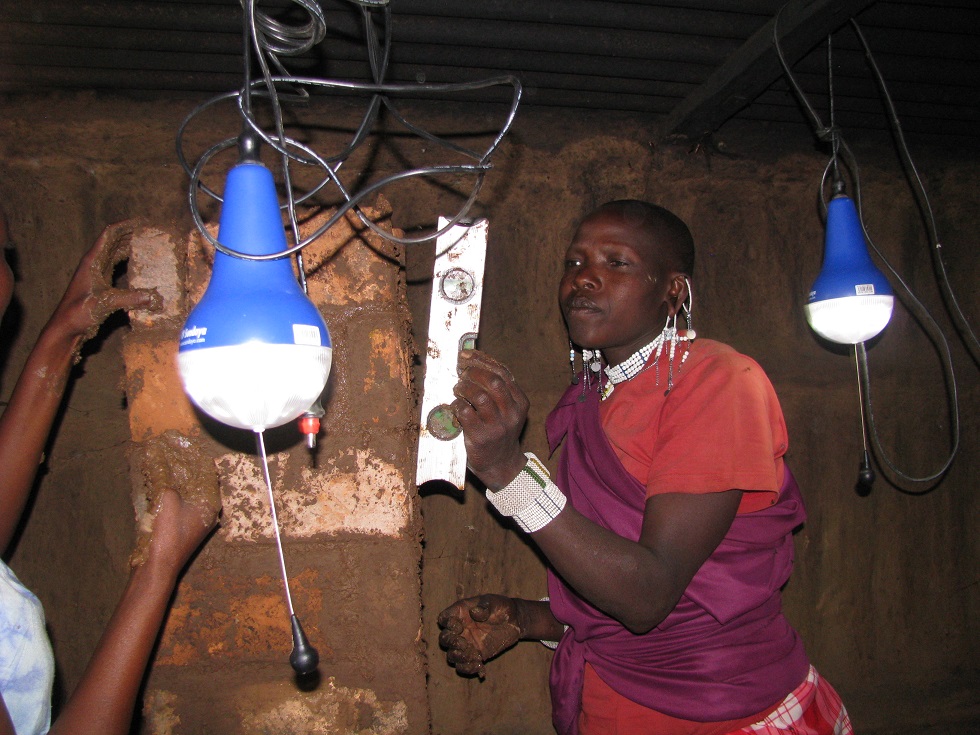Help train Women’s Installation Teams in Tanzania to build stoves to improve health and provide women with employment.
Why we care: Household air pollution from indoor cooking fires is the cause of a worldwide public health crisis involving millions of people in developing countries. The smoke sickens and kills more than 4 million each year, primarily women and children.
How we’re solving this: Training Women’s Installation Teams to replace indoor cooking fires with clean-burning stoves, which will create jobs for Maasai women and improve community health and the environment.
The Maasai Stoves & Solar Project designs and installs chimney-based, clean-burning and efficient wood-burning stoves and solar panel-based electrical systems in the homes of the Maasai. The stove was designed in collaboration with the women who actually use it. Built specifically for indoor cooking, it has a smoke-removing chimney, and does not require the women to change their cooking style. The stove uses 60 percent less wood contributing to conservation of nearby forests, decreasing greenhouse gases in the atmosphere, and helping to mitigate climate change. Each stove saves 12 hours of women’s wood-gathering labor per week. By replacing the indoor cooking fires, this project will support dramatic health improvements. The Maasai Stoves & Solar Project has been working to improve health conditions of the Maasai since 2009.
This project will bring the healthier stoves to four more Maasai villages, improving life and opportunities for 1000 girls and women by:
- Training four new Women’s Installation Teams which will provide jobs;
- Expanding stove manufacturing capacity and stimulating local business;
- Organizing community action to bring the stoves to new villages; and
- Installing stoves in 400 homes in the first two months, improving health and the environment.
The Maasai village women will appoint the members of the Women’s Installation Teams. The teams will then replace indoor cooking fires with the stove and chimney. For many of the team members, this will be the first paying job of their lives. The women are eager to learn new skills at the training sessions. They mix mortar, lay bricks, and use construction tools as they install improved cookstoves. They are proud to be part of this work that brings so many benefits.
Project staff members will assist by providing daily transport and delivery of bricks, cement, and tools needed. These women spend ten days teaching stove principles and construction techniques to the ten women who will be the new leaders and installers. The training ends with the installation of stoves in the homes of the first buyers in the new village.
Once the installation team is established in a village, it will take three or four women working together to install each stove efficiently. They must mix the cement; level the floor; cut a hole through the rafters and thatch roof; and lay bricks for the chimney and stove foundation. Team members become masters of all aspects and divide the work cooperatively.
This project will also provide employment and stimulate the local businesses that supply machines and materials to build the stoves. Funds will cover the expansion of local manufacturing capacity to supply fireboxes for the new villages. We will need to produce another 200 stoves per month. This creates four new jobs in steel work. This project will thus also support improvements to local factories to increase production capacity. Part of the funding will cover welders, electrical generators, machines to bend and cut steel and hand tools that are necessary for steel workers.
There are 300-600 homes in a Maasai village. All the women in a village want a stove once they see how much cleaner and healthier their homes can be. They see how much labor they will save by reducing the need to gather so much wood. Once the stove sales process is in full swing, the installation teams can put in up to six stoves a week. With your support, 400 stoves will be installed in the first two months.
To learn more about the Maasai Stoves and Solar Project, please visit http://internationalcollaborative.org/


